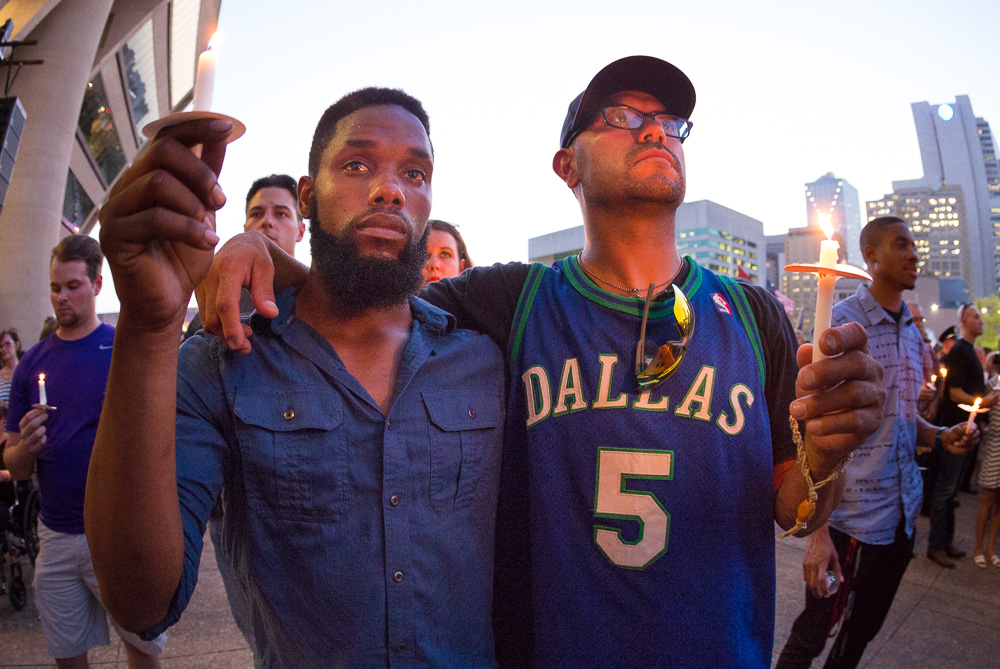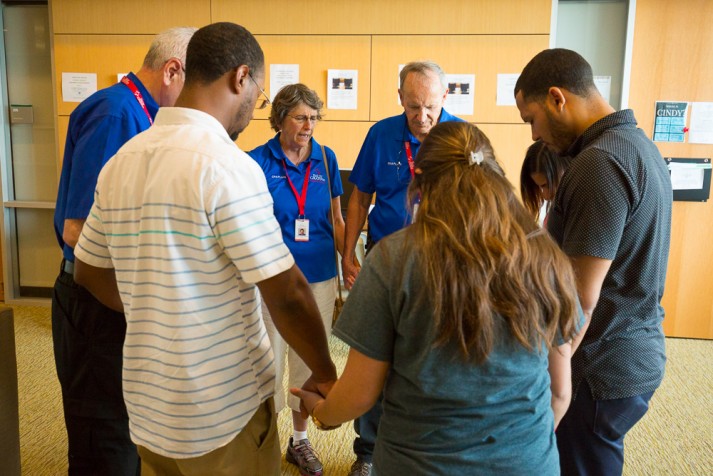
Don’t be afraid to say, “Hi.”
That’s one way to tackle the race relations problem building in America, according to Ashley Johnson.
Johnson is the public relations and communications director at the University of North Texas at Dallas, a school so diverse she’s among the minority as a white woman.
Yet, that step outside her comfort zone has proved beneficial, especially now as faculty and students alike process last week’s tragic police shooting the Dallas police chief has said was rooted in racism.
“There’s so much fear, and it’s silly because—at the end of the day—we’re all people,” Johnson said.
“We might look different on the outside, but it makes for prettier pictures.”
Johnson was moved to tears on Monday as she walked up on the Billy Graham Rapid Response Team chaplains huddled in a circle on campus with some of her fellow staff—praying for their school and their city.

Dallas, once known as the “city of hate” after the assassination of President John F. Kennedy, has worked hard to build a reputation—especially in law enforcement—of being loving, fair and inclusive.
But the July 7 attack that left five white police officers dead was a huge blow to the city. Crisis-trained chaplains with the Rapid Response Team arrived in Dallas the next day to provide emotional and spiritual care.
“Dallas is a city that never thought this would happen,” said Rapid Response Team chaplain Leo Grabowski. “God is preparing our hearts now for a healing ministry and healing in this nation where they’ll be no more black-on-white, white-on-black [hatred].”
Putting Feet to the Passion
While at UNT Dallas, chaplains were graciously allowed to interrupt a university planning meeting involving some of the school’s top leadership, including the president, to offer prayer.
The school is building a model to help students, from an educational perspective, work through very real, yet very tough issues like race relations and become a positive voice in their community.
“An educated society can help make those kinds of changes, to start that dialogue and those conversations that need to happen,” Johnson explained. “The events now just reinforce why we’re here and what we need to do strategically to accomplish it.
“This is about putting feet to that passion.”
Upcoming junior Jennifer Contreras was planning to go to the Black Lives Matter rally with her brother the night of the police shooting, but changed plans. When she heard the news, “My heart dropped.”
“You would never expect this to happen in your own backyard,” she said. “Aside from me feeling sad, it’s made me want to do more. I want to help, but in the right way.”
Contreras’ heritage is Mexican, and says she often feels her voice isn’t heard as a minority.
“Our students deal with this on a daily basis,” Johnson said. “God’s definitely opened my eyes in a lot of ways … I didn’t realize how privileged I am.”
Johnson joined in as chaplains prayed over Contreras and her future.
“It’s been helping me stay strong—knowing God’s there,” Contreras said. “One of my good friends always tells me, ‘Walk by faith.’ And that’s the advice I would give my generation.”
A Common Thread
Even before the Dallas tragedy, students had been dealing with a variety of emotions as deadly shootings involving black men and white police officers continued to make headlines.
Now add to that fear and anger a confusion as students learned some of the very men who protected and worked with them during protests and rallies were now gone.
But there’s common ground to be found through these tragedies on both sides, says Jay Hayes, who works as the Veteran Success Center coordinator at UNT Dallas.
“If we want to relate, a common theme and thread through all of this is the fact that all of these people were undeserving of what happened to them,” Hayes said.
“I hate that those officers lost their lives in Dallas Thursday,” he continued. “Those cops didn’t deserve that, just like some of these other people that have been killed at the hands of cops didn’t deserve that either.”
As a black U.S. Navy veteran who also served as a military police officer—Hayes brings a unique perspective. To unite all sides of the issue, he says we each have to own up to our part.
“We get a bit prideful and steer away from the ugly truth,” Hayes said, referring to the tendency to point fingers at other races without recognizing the faults within ourselves. “It’s difficult to look truth in the face and say, ‘Whoa, that’s me, too.’
“We need to put this pie on the table, this pie of mess, of social inequality. And everyone needs to get their fair portion and take responsibility for that,” he added. “The entire problem shouldn’t be blamed on one group.”
Hope for the Future
Hayes got emotional as chaplains prayed with him and other staff. Though he appreciated the prayers, he challenged Christians to take it a step further.
“We need to pray every day. We need prayers like that in the middle of the semester; even a couple of weeks from now,” he said.
“Continue to pray. Let’s not just respond and be reactive to events that happen like this. This should be sustained.”
As another challenge, Johnson hopes those typically in the majority like her will do something “real uncomfortable” to connect with people of a different race and background.
“Think about the place that you cannot imagine yourself serving in, and go do it,” Johnson said. “Immerse yourself in community. Walk beside people. Have conversations.
“Don’t be afraid to just say, ‘Hi, how are you? Where are you from?’ and see where the conversation goes.”

